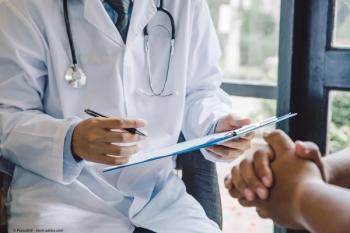
Data reveal timeline of post-IPP infections
Isolated anaerobic organisms appear to occur most rapidly on average when infections occur following surgical intervention with an inflatable penile prosthesis (IPP), according to data presented at the 2018 AUA annual meeting in San Francisco.
Isolated anaerobic organisms appear to occur most rapidly on average when infections occur following surgical intervention with an inflatable penile prosthesis (IPP), according to data presented at the 2018 AUA annual meeting in San Francisco.
Researchers found that gram-negative organisms have the longest delay between device implantation and surgical management of infection.
The authors examined the timeline of microorganisms, infection severity, and surgical intervention in men who received an IPP. They found that 71% of anaerobic infections underwent successful salvage compared with 64% of gram-positive infections. Successful salvage rates were 60% in men with fungal infections and 59% in men with gram-negative infections.
“You have to be vigilant throughout the first year after penile prosthesis placement, and there seem to be particular trends as far as what is presenting when,” said first author Martin Gross, MD, clinical assistant professor of surgery at Dartmouth College’s Geisel School of Medicine, Hanover, NH.
Dr. Gross and his co-authors reviewed a multi-institution database of IPP infections to look for patterns regarding organisms discovered at salvage or explant surgery. They also examined interventions deemed necessary by contributing surgeons based on severity of infection. This retrospective analysis included 221 patients at 26 institutions who underwent salvage procedure or device explant between 2001 and 2016.
Seven isolated anaerobic infections were treated an average of 2.6 months after device implantation (range, 1 to 7.5 months), the study showed. In addition, clinicians treated 62 isolated gram-positive infections an average of 4.5 months after device implantation (range, 2 weeks to 38.5 months) and 14 isolated fungal infections an average of 5.8 months after device implantation (range, 1 to 27 months). In this cohort, a total of 39 isolated gram-negative infections were treated an average of 6.96 months after device implantation (range, 2 weeks to 81 months).
“Anaerobic infections are presenting first, gram-positive infections are next, and then slower infections such as fungal infections and gram-negative infections are really later on by the middle of the year. And by the end of the year, multi-organism infections are more likely to be presenting,” Dr. Gross said in an interview with Urology Times.
The study showed that 24 multi-organism infections were treated an average of 5.2 months after device implantation (range, 2 weeks to 27 months), and 67 infections had no growth seen in culture but were treated an average of 4 months after implantation (range, 2 weeks to 58 months). The authors found that among the seven anaerobic infections, five devices underwent successful malleable implant salvage (71%) and the other two were explanted.
Next:
Dr. Gross, who presented the study findings at the meeting, said that among the 62 gram-positive infections, 25 devices underwent successful malleable implant salvage (40%), 22 were explanted (35%), and 15 underwent classic Mulcahy salvage (24%). Among the 14 fungal infections, four patients had malleable implant salvage (40%), four devices were explanted (40%), and four were salvaged using the classic Mulcahy technique (20%). Among the 39 gram-negative infections, the findings were similar, with 10 undergoing malleable implant salvage (26%), 16 devices explanted (41%), and 13 salvaged in the classic Mulcahy technique (33%).
“What we are seeing is very different from what the AUA guidelines are designed to protect against. The AUA guidelines were designed for the bacteria we were seeing 20 to 25 years ago,” said Dr. Gross. “We are now getting bacteria that are different. The AUA guidelines need to be updated.”
Dr. Gross is a consultant for Coloplast.
Newsletter
Stay current with the latest urology news and practice-changing insights — sign up now for the essential updates every urologist needs.






